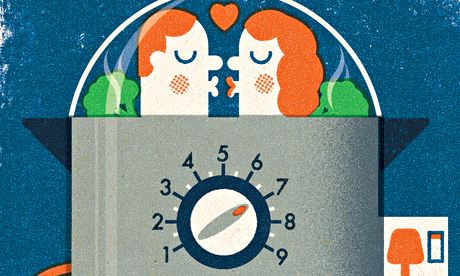
Dating advice, in general, falls into two categories: the completely terrible and the largely terrible. In her recent book It's Not You: 27 (Wrong) Reasons You're Single, the US journalist Sara Eckel skewers many examples of the former. "Well, you're the constant here," people with a string of failed relationships are sometimes told by friends. "Maybe the problem is you." But, as Eckel notes, each of us is by definition the constant in our romantic lives. (If you're involuntarily single, it may be you, but it may be luck, or any number of other factors; your singlehood provides no evidence either way.)
One of the less obviously bad ways in which we approach dating is how we think of it as a market. According to this viewpoint, each of us has a market value – based on looks, charisma, money and intelligence – on which most of our potential partners agree. If your value's extremely high, you take your pick. The rest of us must settle for the best we can get.
This isn't entirely wrong. On first impression, people do tend to agree about who's most attractive. But a US study just published in the Journal of Personality and Social Psychology should cheer anyone who doesn't think of themselves as one of the beautiful people: the consensus, it shows, is short-lived. Researchers Paul Eastwick and Lucy Hunt asked a group of heterosexual students to rate their opposite-sex classmates for such qualities as attractiveness, warmth and potential for success. At the start, they largely agreed who came out on top, but three months in, the consensus had vanished. As the students got to know each other, more and more of them acquired a few secret admirers. As the authors put it, summarising their research in the New York Times: "If you do not have a high mate value, take heart. All you need is for others to have the patience to get to know you, and a more level playing field should follow."
More happily still, they probably will have that patience. Contrary to another piece of dodgy conventional wisdom – the importance of the sudden spark upon first meeting – most of us meet our future girlfriends, boyfriends or spouses through being friends for a while, write Eastwick and Hunt (though internet dating grows ever huger, too). It's not that we target someone for potential romance, then work our way into his or her social circle, then step things up a gear; rather, we gradually come to see certain friends as more than friends, and the person we fall for isn't especially likely to be someone with high market value. Relationship "experts" like to say you never get a second chance to make a first impression, but what they never add is that it doesn't really matter.
Pleasingly, this also helps to unseat the ridiculous (and sexist) notion of the "friend zone", a common trope in advice aimed at men, according to which the world is full of lovelorn males cruelly relegated to friend status by the women they desire. In fact, friendship turns to romance all the time – provided it's sincere friendship to start with, not an underhand strategy to sleep with someone. The best dating advice, it turns out, may be this: spend time getting to know other people, and not only the ones you think you'd like to date. Stunning stuff, isn't it? You can thank me in your wedding speech.
oliver.burkeman@theguardian.com
Follow Oliver on Twitter

